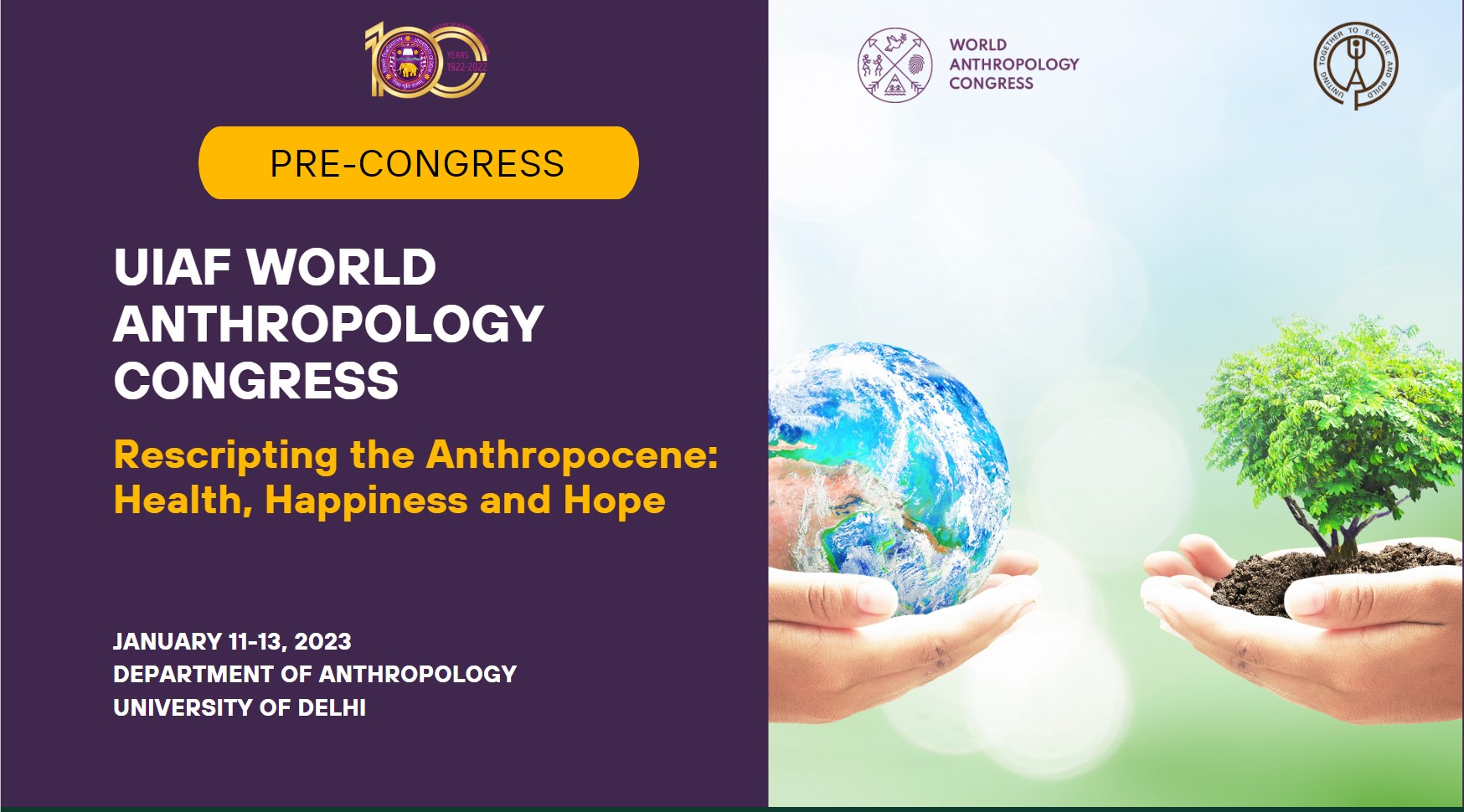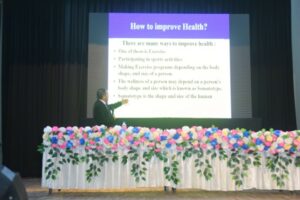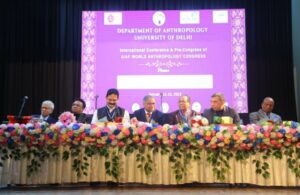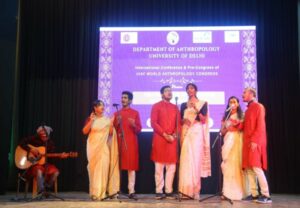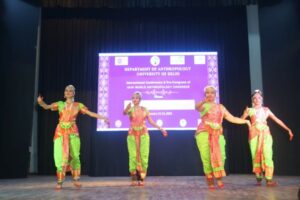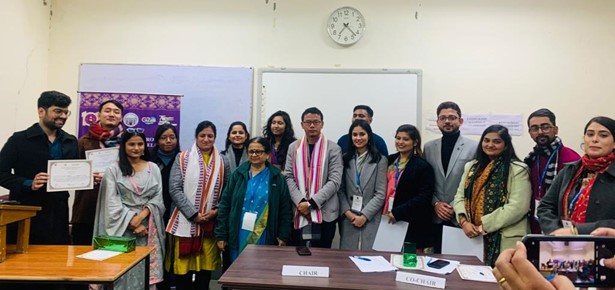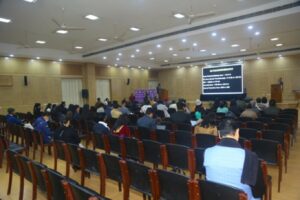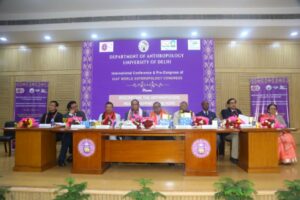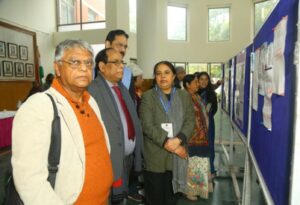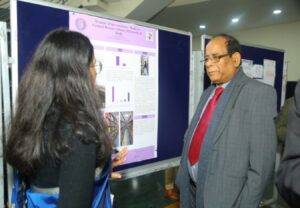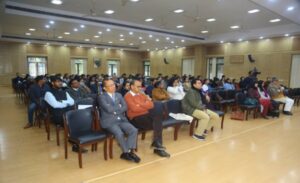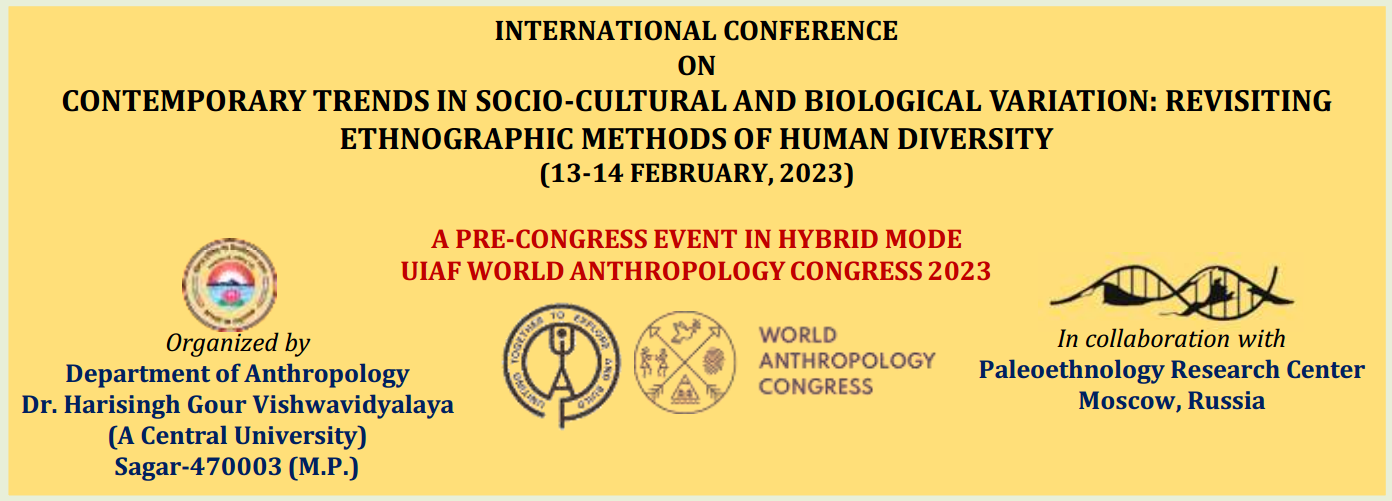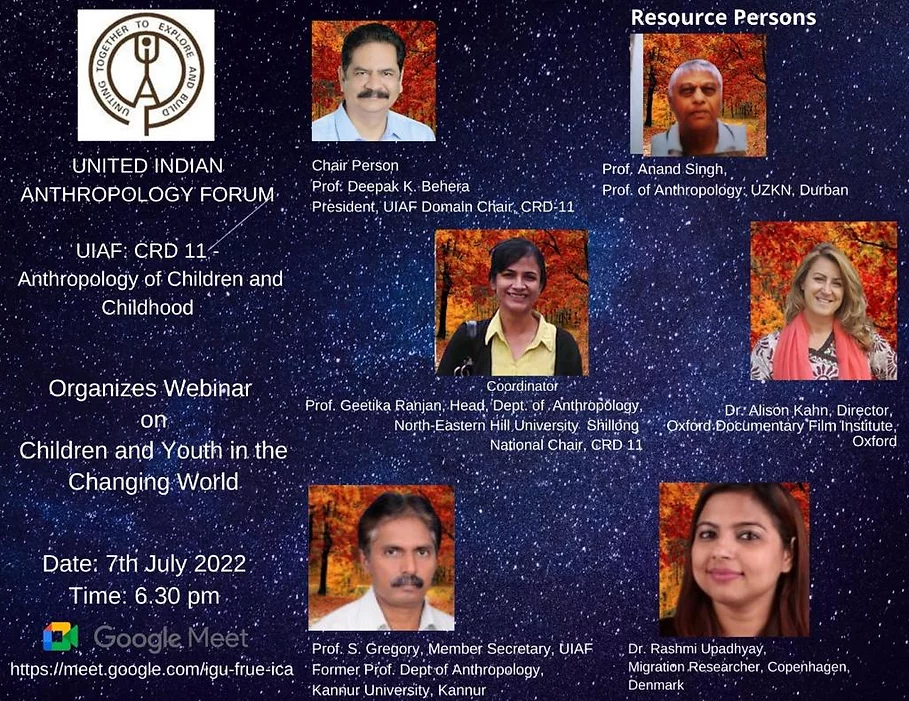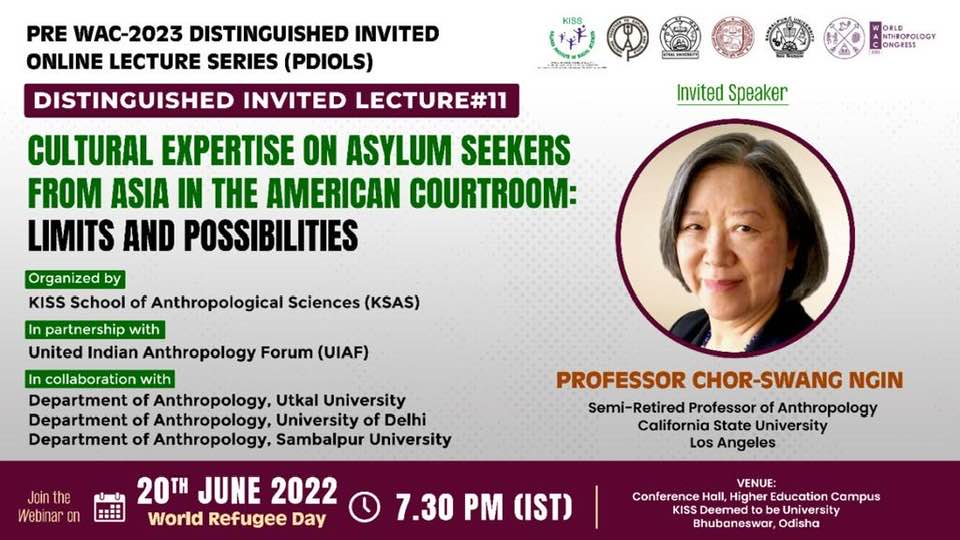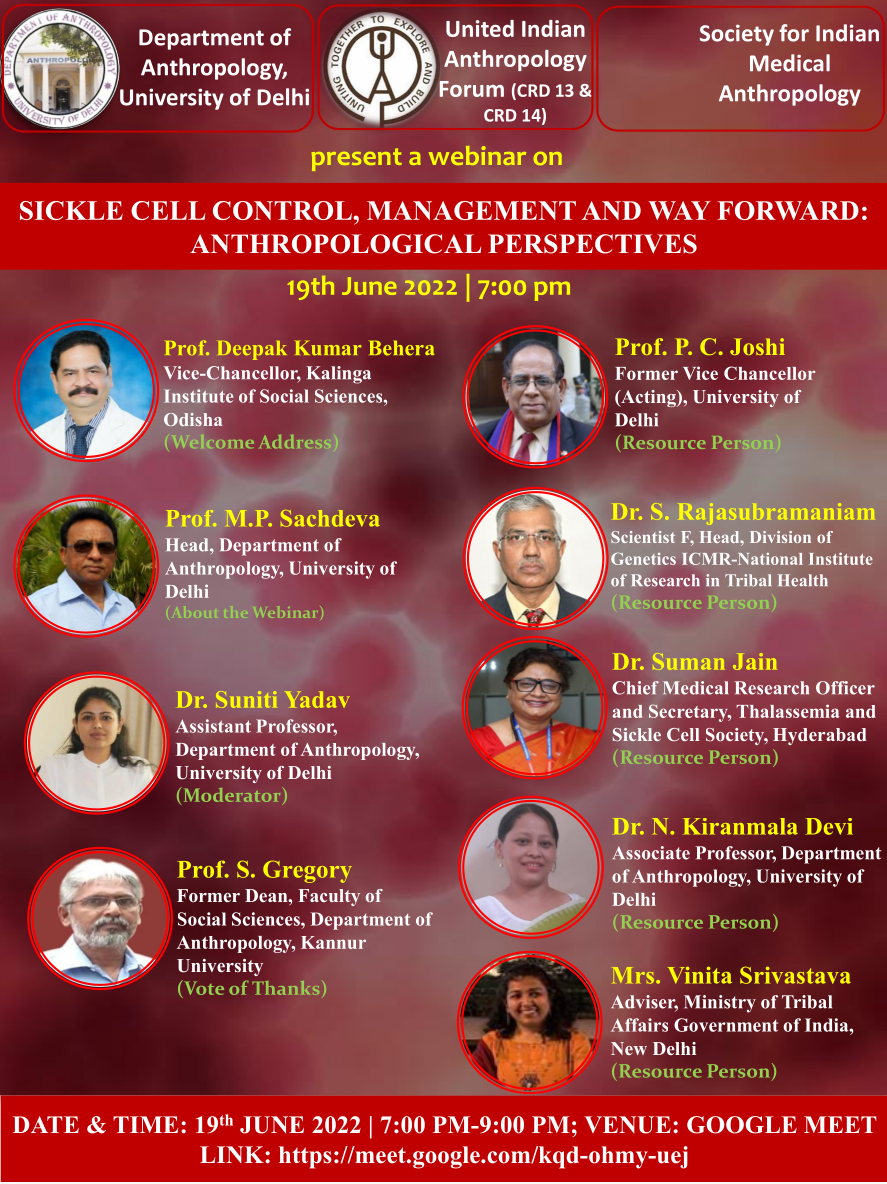SUMMARY PROCEEDINGS OF INTERNATIONAL CONFERENCE AND PRE-CONGRESS
WORLD ANTHROPOLOGY CONGRESS (WAC-23)
Rescripting the Anthropocene
Health, Happiness, and Hope
Conference Report
The Department of Anthropology, University of Delhi organized a three-day International Pre-Congress under the aegis of the United Indian Anthropology Forum (UIAF) on the topic ‘Rescripting the Anthropocene: Health, Happiness and Hope’ from January 11th -13th, 2023. The conference commemorated the centenary foundation year of the University of Delhi and marked the 75 years of establishment of the Department of Anthropology, University of Delhi.
Focus of the congress was on climate change, Anthropocene, and its adverse impact on health and well-being, especially with reference to marginalized communities in India. Ever since the term Anthropocene came into being, to designate the human-dominated era of unprecedented large-scale environmental changes, questions have been raised regarding the nature of the relationship between human beings and their surroundings. Rapid Population boom, industrialization, and technology-driven transformation pose serious threats to the lives and livelihoods of already vulnerable communities. The linkage between the global economic process and the deteriorating quality of life in many parts of the world has also come to the fore, with India taking up the Chair of the G20 summit.
Overall, 22 invited speakers and nearly 175 participants presented their papers in 18 sessions (15 offline and three online sessions) spread across three days. Of the 22 invited speakers, 12 were from reputed Indian institutes, and 10 were international speakers from the USA, the UK, France, Russia, Canada, and Bangladesh. Apart from 18 sessions for oral presentations, one round table discussion and two poster sessions were also organized. Further, the conference was attended by more than 300 participants from various Indian and international universities and Research Institutions.
The conference was initiated with the lighting of the lamp ceremony by various dignitaries, including the Chairperson of the Conference, Prof. M. P. Sachdeva; Convenor of the Conference, Prof. P. R. Mondal; Organizing Secretary, Prof. K. N. Saraswathy; Veteran Anthropologist Prof. A. K. Kalla; President of UIAF and the Vice-chancellor of KISS University, Odisha, Professor Deepak Behara, and the Director of South Campus, University of Delhi, Prof. Shri Prakash Singh.
In the inaugural session, Prof. Shri Prakash Singh, talked about the Indian Knowledge system and the concept of sustainability and happiness. The Vice Chancellor of Kalinga Institute of Social Sciences emphasized peace as another important dimension, and the senior scientist from the Department of Biotechnology, Dr. Mishra spoke on the linkages of social, biological, environmental, and techno-digital systems. The ceremony was concluded with the vote of thanks by Prof. K. N. Saraswathy. The inaugural lecture was delivered by Prof. P. C. Joshi on the topic of “Medical Anthropology of Well-Being and Happiness” and argued for a new model of clinical practice in medical anthropology that is more holistic, integrated, and empowering for patients.
Various sessions of the conference brought together experts from various fields to discuss and present their research in anthropology. The first session of the conference was chaired by Prof. P. C. Joshi and co-chaired by Dr. Naresh Vaid. The first speaker, Prof. Deepak Kumar Behera, discussed the KISS Model of holistic education in response to challenges in tribal education in India. The second speaker, Professor Frederick L. Coolidge, presented his paper on diplomacy in the Anthropocene, and how the retro splenial cortex may play a critical role in shaping diplomacy in the era of environmental changes. Other eminent speakers presented their works on the impact of liberal economics on language, culture and society in India, the role of hope in the time of the COVID-19 pandemic, and menopause from an anthropological perspective.
In Session 2, the topics covered included food composition tables in nutrition, commercialization of health and happiness, knowledge, and practices towards the risk of lung cancer in the Khasi community of Meghalaya, and more. The speakers emphasized the importance of bridging gaps in various fields, addressing cultural biases, and promoting awareness and sensitization in their respective areas of research.
A mesmerizing cultural program was presented by the students and research scholars of the Department of Anthropology, University of Delhi, after the academic sessions. Cultural programme highlighted India’s cultural diversity, vividly depicted by the students of the department coming from different states of the country.
Photos of Day 1 of the Conference
On the second day of the conference, parallel sessions were conducted on biological, bio-social, and social anthropology, chaired and co-chaired by distinguished academicians. Overall, four parallel sessions were conducted. The Biological Anthropology sessions were chaired and co-chaired by Prof. S. M. S. Chahal, Prof. Surya Prakash, Prof. Mitashree Mitra, Dr. Ratika Samtani, and Dr. Gagandeep Kaur Walia, Dr. Yumnam Luxmi Devi, Dr. Harvinder Kaur, Dr. Huidrom Suraj Singh, respectively. The speakers in this session were from different institutes like University of Manipur, University of Delhi, Sports Authority of India, and University of Calcutta, to name a few. The major topics of the presentations included cardio-metabolic diseases like hypertension, diabetes, etc., forensic evidence collection, climate change and pollution, mental health, reproductive health, and growth.
Simultaneously the Social Anthropology sessions were chaired by Prof. Abhik Ghosh, Prof. Daniel Negers, Dr. Urfat Anjem Mir, and Prof. Suparna Sanyal Mukherjee; the co-chairs were Dr. Snigdha Vishnoi, Dr. Priyasha Kaul, Dr. Nongthombam Achoubi, Dr. Lovitoli Jimo. The speakers in this session discussed gender and identity, climate change, migration, socio-economic transformation, and the associated developmental aspects among different communities.
The bio-social anthropology sessions covered the topics like health-seeking behaviour, ethnomedicine, reproductive health, cognition, etc. Presentations in this session, broadly elucidated the theme of this conference. The bio-social anthropology sessions were chaired by Prof. Subho Roy, Prof. Roumi Deb, Dr. Dolly Florence, and Dr. Arup R. Bandyopadhyay. The co-chairs were Dr. Snigdha Vishnoi, Dr. Priyasha Kaul, Dr. Nongthombam Achoubi, and Dr. Oinam Hemlata Devi. The second day of the conference yielded thought-invoking discussion on human health and happiness.
Photo from Day 2 of the Conference
The third and final day of the conference captured the essence of the theme of the conference, “Rescripting the Anthropocene: Health, Happiness and Hope” in its true sense. The concluding day was initiated with the session chaired by Prof. Frederick L. Coolidge and co-chaired by Dr. Harpreet Kaur. The session had three speakers, Prof. Vijoy S. Sahay, Prof. S. Jibonkumar Singh, and Prof. S. P. Singh. The first speaker, Prof. Vijoy S. Sahay, discussed the current epoch known as the Anthropocene, where human activities have caused mass extinction of species. The second speaker, Prof. S. Jibonkumar Singh, presented a study on the ultra-sonographic fetal biometry of Meitei prenates in their third trimester of pregnancy. The third speaker, Prof. S.P. Singh, spoke about the skeletal maturity of boys and the importance of studying the maturity status of children for their growth and development.
In Session 9, three speakers presented on various topics in health and medicine. The first speaker, Dr. Ashish Joshi, discussed the SMAART model in population health informatics. The second speaker, Prof. Kewal Krishan, presented on the contribution of anthropological knowledge to forensic investigation. The last speaker, Dr. Sarabjit Mastana, discussed the role of anthropological genomics in personalized medicine.
The tenth session was chaired by Prof. Shalina Mehta and co-chaired by Prof. Mohan Kumar K P. The first speaker was Dr. Antoinette E. DeNapoli, who presented her paper on female gurus in South Asian Hinduism. The second speaker, Prof. Barry Bogin, talked about hope and its impact on growth and development. Finally, Prof. Elena Godina discussed growth studies in Russia, highlighting the country’s important contribution to auxology.
Post lunch was marked by the most interesting and thought-instigating event, the Round Table Discussion on “Reimagining Anthropology at 2047: Challenges, Imperatives, and Future of Humanity”, chaired by Professor P. C. Joshi, University of Delhi. There were eleven renowned anthropologists, namely Prof. Deepak Behera, Dr. Vipin Gupta, Dr. Naresh Vaid, Prof. Subho Roy, Dr. Anup Adhikari, Prof. K. N. Saraswathy, Prof. R. P. Mitra, Prof. Mitashree Mitra, Prof. Arup R Bandyopadhyay, Prof. S. M. S. Chahal, and Prof. Vijoy S Sahay, from all around the nation participated in this discussion. The speakers discussed the future of anthropology through their perspectives and shared their views on the challenges and imperatives of the discipline. Prof. Joshi emphasized the importance of making anthropology more visible to people and highlighted the strengths of the discipline as Bio-Socio-Genomics and Prehistory.
Prof. Behera discussed the problems in academia and suggested introducing anthropology in schools and reviving old fieldwork traditions. Dr. Gupta talked about the impact of Artificial Intelligence on social environment and the need for anthropology to obtain quality data. Dr. Vaid reminded the audience of the holistic nature of anthropology and the importance of including genetics in social anthropology. Prof. Roy questioned the direction of the discipline in the future and if changes will be driven by social or internal forces.
Dr. Adhikari brought a different perspective and suggested that research must be community based, with a focus on health and wellness, and a job-oriented curriculum. Prof. Saraswathy emphasized the need for a fusion of bio-cultural aspects, the importance of adapting tools from other disciplines, and the need for more funding and collaboration in research. Other eminent speakers discussed the importance of not losing the identity of anthropology when borrowing ideas from other disciplines, and the need for taking a moral stand on issues. They highlighted the need for new concepts and theories to keep the discipline growing. Prof. Chahal discussed the upcoming homogenization of the Indian population and the importance of collecting diverse data. Overall, the professors emphasized the need for anthropologists to be confident, adaptive, and problem-oriented in their approach.
Round table conference was followed by the valedictory. The valedictory ceremony was presided over by the Chief Guest of the ceremony, Prof. Balaram Pani, Dean of Colleges, University of Delhi. In the valedictory ceremony, the welcome address was given by Prof. M. P. Sachdeva. The convener’s and organizing secretary’s remarks were read by Prof. P. R. Mondal and Prof. K. N. Saraswathy, respectively. Prof. R. P. Mitra read the conference report in which he gave a brief summary of the three days of the conference. Prof. Mitra’s address was followed by the release of a book titled ‘Biographical Account of Indian Anthropologists’ edited by Prof. P. C. Joshi.
After the book release, Prof. Anand Singh, University of KwaZulu-Natal, South Africa, delivered the valedictory address titled ‘Early 21st Century Anthropological Practice in South Africa’. In his paper, Prof. Singh discussed the importance of developing a vocabulary and emphasized that he is not being xenophobic and apologetic, but people need to have a lot more confidence in what they do and how they build up this vocabulary, conceptual framework, and the ideas that emanate from the civilizational achievements that this part of the world has actually brought about.
Next, the Guest of Honour, Prof. K. K. Basa, National Monuments Authority, Ministry of Culture, Government of India, addressed the audience. In his address, he touched on many aspects related to the environment, archaeology, geology, and plastic pollution and elaborated on the theme of the pre-congress conference. He briefly discussed the aptness of the theme “Health, Happiness and Hope”. During the valedictory ceremony, Dr. Kumkum Srivastava, University of Delhi, was felicitated and invited to say a few words in remembrance of Prof. Vinay Kumar Srivastava. Finally, Prof. Balaram Pani, Chief Guest of the ceremony, addressed the gathering. Prof. Pani, in his address, talked about the concept of happiness and the subjectivity of the happiness index. He also appreciated the extensive coverage of topics related to health over the three days of the conference. He further suggested that traditional knowledge should be blended with modern technology for achieving the goals of health, happiness and hope.
Photos from Day 3 of the Conference

